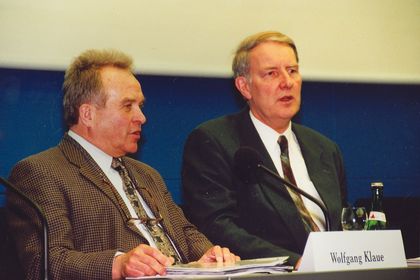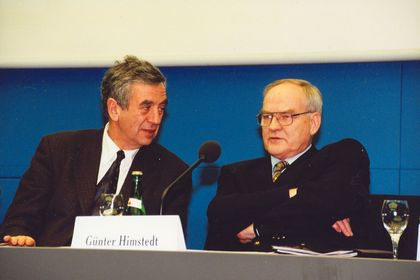History of the DEFA Foundation
The DEFA Foundation was established nine years after the GDR ended. The first director of the DEFA Foundation, Wolfgang Klaue, describes the foundation’s fascinating and bumpy beginning.
The Background of the DEFA Foundation
A historical side note that people don’t remember: There was already a DEFA Foundation in 1990. And what became of it?
On September 25, 1990, the last GDR government established the DEFA FOUNDATION as one of its final legal acts. A few days later, the Minister of Culture appointed a board of trustees. After October 3, 1990, this DEFA Foundation died a slow death. It suffered from mistakes made in its origination, and it ceased to exist without an exact end date ever being determined.
Because of its opaque business operations and some dubious contracts, DEFA foreign trade found itself the focus of criticism by DEFA filmmakers after the Wende in 1989. In spring 1990, the Minister of Culture decided to liquidate DEFA foreign trade, e.g. the foreign rights to DEFA films and the property in Milastraße were transferred to the DEFA Foundation through the aforementioned law.
As it would appear in the few months of its existence, the DEFA Foundation of 1990 faced insurmountable stumbling blocks right from the start:
- Foreign trade rights, i.e. foreign rights to DEFA films, were transferred to the foundation. The old federal states were foreign.
- Domestic rights, i.e. the rights for the new federal states, remained with Progress. There was no answer as to how this should work in practice.
- The Foreign Trade Office appeared to be without restitution in 1990. As it turned out, this was a mistake.
- The DEFA studio for documentary films terminated its contracts with the DEFA Foreign Trade office and recovered the foreign trade rights for its own films. In an extensive report by a renowned West Berlin law firm, this action was confirmed and therefore shed fundamental doubts about the DEFA Foundation’s legitimacy.
- The legal cardinal error: the DEFA Foundation of the GDR had the status of a publicly-owned foundation. The laws governing foundations in Berlin did not allow for this type of foundation in Berlin. Thus, the DEFA Foundation was not formally recognized until October 3, 1990.
The DEFA Foundation of the GDR failed from errors of its founding in the first months after reunification.
However, the basic idea underlying its foundation remained intact and was respected by the Treuhand Trust Agency and federal authorities in the next years. The rights to films from four decades of DEFA productions were not privatized with the privatization of the studios. Treuhand took over these rights and commissioned PROGRESS Film-Verleih GmbH as a trust company with full exploitation rights of the films.
The Founding of the DEFA Foundation
Nine years passed until the DEFA Foundation’s second birth. Too long of a time. But to that end, as fears and frustrations about the privatization and handling of the DEFA operations grew, public pressure to create a DEFA Foundation had decreased. And from the perspective of Treuhand, there didn’t seem to be an acute need for action. PROGRESS film distribution company didn’t run its budget in the red. Only after the privatization of the film distributor was placed on the agenda in 1995-96 were the preparations for the founding of the DEFA Foundation intensively begun.
The underlying concept was based on the GDR model and adapted it to new conditions and new insights: Treuhand transferred the rights of the DEFA film stock to the DEFA Foundation. The foundation granted the privatized PROGRESS the exclusive exploitation rights. The relationship between PROGRESS and the foundation is designed to fulfil three premises:
- The jobs that existed at the time of PROGRESS’s privatization would be retained.
- The foundation must keep an adequate amount of the revenue earned through exploitation of the DEFA film stock for the support of film culture and to fulfill its tasks.
- The economic relationship between PROGRESS and the foundation must provide the distribution company an incentive to work with DEFA films.
The further one delved into the subject, the more the devil appeared in the details. The need for clarification about the following problems among others arose:
The Scope of the DEFA Film Stock
There was a need to clarify that all the rights for the production and distribution process would be transferred to the future foundation. Synchronization rights and the permanent distribution license for foreign films in the GDR, as well as productions from the H&S Studios and unpublished materials, went unmentioned in official reports for the preparation of the foundation.
It was also necessary to unambiguously clarify that not all rights to all the films made in the studios could be transferred to the foundation. All commissioned productions were excluded.
The Unity of the DEFA Film Stock
For very understandable reasons, there were efforts to dissolve parts of the rights inventory from the DEFA film stock and to make them independently accessible from an exclusive exploitation of the DEFA film stock , e.g., newsreels and political propaganda films.
The Chain of Title
The contracts for the privatization of the DEFA Studios stipulated that the rights to the films produced in the past are not the subject of sale. Treuhand had no legal recourse to claim rights to the movies. This “chain of rights” had to be established in order to equip the foundation with all the rights necessary for the unrestricted exploitation of the DEFA film stock.
The Privatization Model
Finding alternative options besides private shareholders for the sale of PROGRESSS were considered. The concept of a corporate foundation, i.e., making the foundation itself the owner of PROGRESS Film Distribution Company was looked at, and it was considered to be a fully functional model.
Questions of Ownership Rights
Ownership of the footage was not regulated in GDR times. There was no determination as to whether the archival footage of the DEFA film stock was the property of the archive, the distributor, the studio, or the film lab. It was decided to transfer the physical property of the DEFA film stock to the Federal Archives.
Inherited Liabilities
It was necessary to analyze the problems from the past with which the newly founded DEFA Foundation and the privatized PROGRESS would be confronted. The financial consequences of overcoming such inherited liabilities could be borne by neither the foundation nor PROGRESS. A so-called “Inherited Liabilities Concept” listed the problems that were not yet fully solved after privatization of the studios and liquidation of other institutions from within the East German film system, notably:
- Regulating the further handling of films from Eastern European countries.
- Developing documentation of the inventory of rights on the basis of existing contracts.
- Processing the written records left by PROGRESS and the foreign trade office for transfer to the Federal Archives.
- Producing a rough system for the files from the animation and documentary studios that were already stored in the Federal Archives.
- Regulating further handling of DEFA films that were still in embassies, cultural institutions, and friendship societies abroad after October 3, 1990.
- Handling unsettled legal issues with contract partners from the former DEFA foreign trade office.
- Applying for legal protection for DEFA films in the USA.
- Possible regulating copyright issues.
- The production of broadcasting materials and new distribution copies.
Advising, understanding, and forming a consensus on the aforementioned problems took time. And these were by far not the only topics that needed clarification. Coordinating with authorities, supervisory bodies of the foundation, and tax authorities were just as indispensable as preparing the foundation’s committees, and the foundation’s function and mode of operation. On December 6, 1998, per request of the benefactor—a federal agency for specific issues related to unification and the Federal Republic of Germany, which was represented by a federal Commissioner for Cultural and Media Affairs—the Senator for Justice approved the DEFA Foundation. On January 28, 1999, the Board of Trustees met for the first time and approved the agreement to endow the DEFA Foundation.
Wolfgang Klaue, Berlin 2000
The DEFA Foundation – A Retrospective
Apropos: Film 2000 – Das Jahrbuch der DEFA-Stiftung; Das Neue Berlin, 2000

Wolfgang Klaue and Detlef Flotho at the press conference for the founding of the DEFA Foundation on February 5, 1999

Minister of State for Culture, Dr. Michael Naumann, and BvS President Guenter Himstedt at the press conference for the founding of the DEFA Foundation on February 5, 1999


